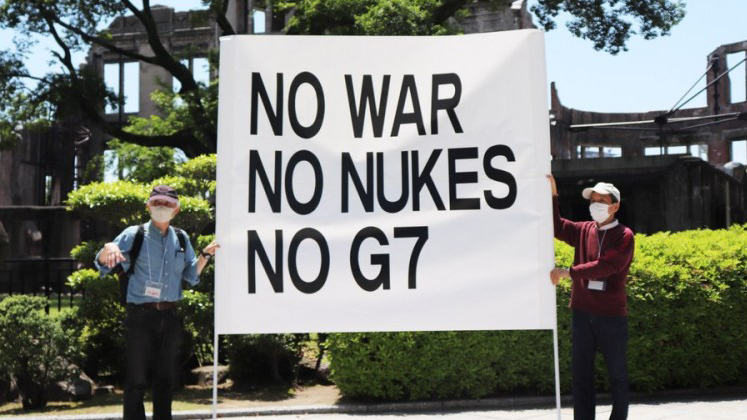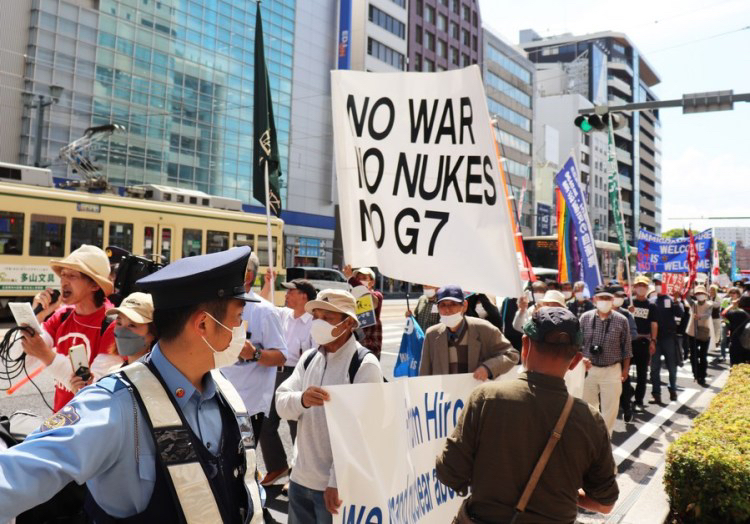
People hold a banner against the Group of Seven (G7) summit at the site of the atomic bombing near the Peace Memorial Park in Hiroshima, Japan, May 14, 2023. /Xinhua
People hold a banner against the Group of Seven (G7) summit at the site of the atomic bombing near the Peace Memorial Park in Hiroshima, Japan, May 14, 2023. /Xinhua
Editor's note: Sun Wenzhu is an associate research fellow at the China Institute of International Studies. The article reflects the author's opinions and not necessarily the views of CGTN.
On May 19, the Group of Seven (G7) annual summit got under way in Japan's western city of Hiroshima. According to media reports, Japan, the host of the G7 this year, intends to link the Ukraine crisis with security in the Asia-Pacific and put it at the top of the agenda, while listing the situation in the "Indo-Pacific" as one of the G7 summit topics, echoing the U.S.' "Indo-Pacific strategy." Japan will also highlight the "China threat" for attendants to discuss.
G7's effort to seize dominance in Asia-Pacific affairs by spreading the confrontational "zero-sum game mindset" indicates that the group has become a means to maintain hegemony and gain advantage in great power competition, with little positive contribution for the peace, unity and cooperation in the Asia-Pacific region.
For Japan, hosting the G7 summit is a rare chance to show its international leadership. By sensationalizing "challenges to the liberal and open world order" and stressing Japan's "contribution" for dealing with such challenges, Japan intends to implicitly confuse the concept of world order, undermining the post-war world order with the United Nations at its core and based on international laws, and replacing it with a "world order" that is wrapped up with "liberal values" that the Western developed countries only.
By playing the role as a critical supporter of such a "world order," one who defends it against "rising challenges" when the U.S. and Western countries as a whole gradually lose their advantage in face of the international power shift ,Japan has found reasons to "abandon decades of pacifism and make itself a true military power", as Time concluded in its article in its latest issue.
It is an effort endorsed, even encouraged by the U.S., who is obsessed with maintaining its hegemony and primacy by mobilizing resources from allies. That also explains Japan's enthusiasm to link the Ukraine crisis with the Asia-Pacific, since it needs a leverage to provoke fear and division to justify its "dominance for regional order" and to introduce outsiders such as North Atlantic Treaty Organization (NATO) into the Asia-Pacific as support.
Furthermore, the selection of Hiroshima as the summit site makes the world focus on Japan was a "victim" of an atomic explosion, instead of the fact that it was Japan itself who invaded other countries and provoked the war. The scene that leaders of global powers gather in Hiroshima would convene to the world that Japan's history as a vanquished fascist aggressor is due to be turned over, and the "post-war era" has ended.
Another risk comes from G7's attitude towards the Taiwan question. In recent years, the G7 countries have repeatedly shown improper and unfounded stances about the Taiwan question, expressing their "concerns for the peace and security of the Taiwan Straits.

People holding banner protest against the Group of Seven (G7) summit in Hiroshima, Japan, May 14, 2023. /Xinhua
People holding banner protest against the Group of Seven (G7) summit in Hiroshima, Japan, May 14, 2023. /Xinhua
There is only one China in the world, both sides of the Taiwan Straits belong to one China. The Taiwan question is an internal, sovereignty affair of China to which allows no foreign interference. That is a critical part of the post-war international order and the most fundamental legal foundation for the relations between China and other countries, including the G7 countries.
That is also the most real status quo of the Taiwan question. It is those "pro-independence forces" in the Taiwan region, as well as certain foreign powers who wish to utilize the Taiwan region to contain China from development and unification, that are actually challenging the peace and stability across the Taiwan Straits.
G7 pays little more than lip service to sticking to the one-China principle, yet while acquiescing in the provocations of "pro-independence forces" in the Taiwan region, they have been trying to put pressure on the rational and legitimate actions of the Chinese government to defend China's sovereignty and territorial integrity. Such doings would not only send mistaken signals to the "pro-independence forces," but also injure the trust basis between China and related countries, thus push the Taiwan question towards a more dangerous direction.
Moreover, G7 summit this year listing "economic security" as a focused topic is a disturbing uncertainty to Asia-Pacific economic cooperation and development. G7 countries try to build up "resilient supply chains" with "like-minded countries," and state that the development of critical and emerging technologies should be in line with democratic values." Such efforts aim at protecting the specific interests of Western developed countries by dividing ideologically confrontational economic groups, so that they may continue to command and dominate the high-tech, high-profit supply chains.
Thus, G7's accusations about China's "economic coherence" appear nothing but absurd considering their own records, especially those of the U.S., use of sanctions, suppressions and other "decoupling" activities. Such a double standard suggests a tendency of developed countries to use their discursive power in making rules and standards for international economic activities to crackdown on competitors, while preserving their own vested interest at the price of the economic opportunities of developing countries, who constitute the majority in Asia and the world as well.
Nowadays, with the rising up of "Global South," G7's international influence has been doubtlessly going downhill. According to China's Ministry of Foreign Affairs, over the past decade, China has contributed more to global growth than all the G7 countries combined. Sticking to their superiority as a club while trying to play a leading role by provoking and manipulating ideological confrontations will only make the G7 a negative factor for global common interest and wellbeing, and drive them away from the trend of peace, cooperation and inclusive development in the Asia-Pacific.
(If you want to contribute and have specific expertise, please contact us at opinions@cgtn.com. Follow @thouse_opinions on Twitter to discover the latest commentaries in the CGTN Opinion Section.)